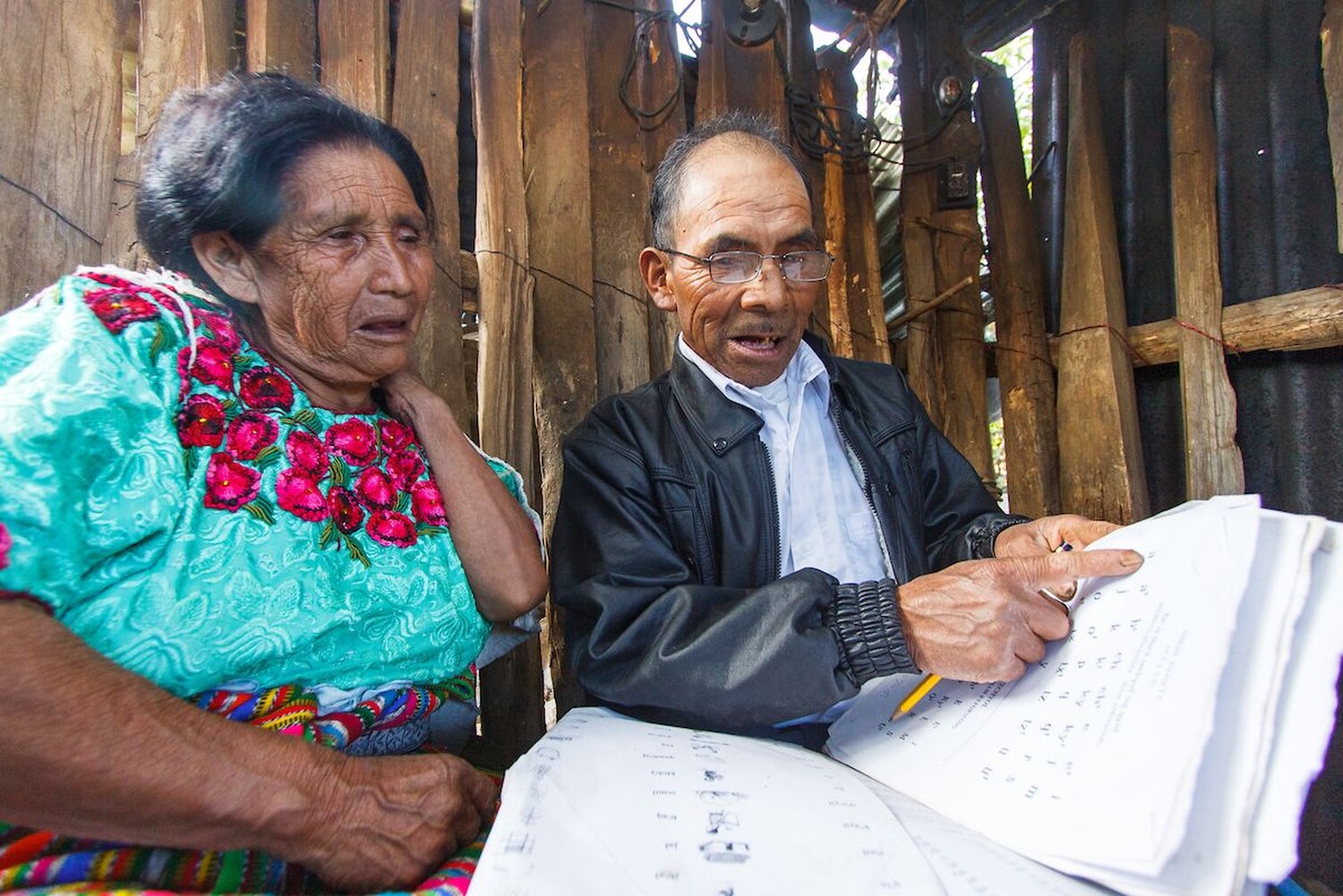It takes a lot of reading material for language communities to get the practice needed to develop true literacy and to find reading worthwhile. Bloom software helps communities create these materials easily. The software’s versatility means that anyone with basic computer skills can create simple picture dictionaries, storybooks, comic books, books for the visually impaired, sign language books, and books with interactive activities. These can then be published in PDF format for print, and as e-books, books for websites, stand alone mobile apps, and even talking books.
Wycliffe Canada members Colin Suggett and Gordon Martin are both part of the international team that developed Bloom. Colin is the lead tester for updates to the software, and he’s also involved in training and in providing user support.
Gordon’s work includes branding—helping client organizations place their logos and layouts in Bloom books specific to their organizations.
“When they upload their books to the website,” says Gordon, “they can proudly point people to their particular ‘bookshelf.’”
The work both men do benefits people around the world.
“Between the Bloom website and the Android app, we are approaching one million books read . . . primarily in minority languages,” Gordon wrote in a recent newsletter to prayer and financial partners. “More than 150,000 books have been downloaded in print, phone, and ePUB formats.”
Because Bloom is free software, it is more accessible for people around the world. Currently, the online Bloom Library exceeds 12,000 titles in more than 500 languages. Many of the library’s holdings were created by translating books from a growing catalogue of pre-formatted, illustrated templates called “shell books.”
For smartphones, the Bloom Reader app (similar to Kindle) enables language communities to download any books created in Bloom. The app then highlights the text as the reader listens.
Creating solutions
When working in local-language literacy projects, literacy workers often end up settling for what is practical, instead of what is actually needed. While workers may hope that a primer and a handful of books will be enough to create a love for reading, in reality hundreds of titles are needed to make reading worthwhile and give the practice needed to develop true literacy. Literacy teachers can’t locate the content for so many books and few have the time to actually create them.
That’s where Bloom helps lower the bar, making it possible for many people to get involved in building a large collection of local language books. New computer users can quickly become proficient in using the software which has special features to guide them in simple book making. Users need far less training than they would for alternatives such as Word, Publisher, or InDesign.
“This week a new typist joined our workshop,” wrote Prossy, a Ugandan teacher, “and I spent half an hour showing him Bloom and then left him to it. When I checked on him later in the day, he was doing just fine. I thought, ‘What other program could I have put in front of him, such that he would be able to use it with just half an hour's orientation?’”
In Cameroon, Bloom is a vital part of the Ndop Cluster project. The Wycliffe Canada-funded project features Scripture translation, mother-tongue literacy, and activities that promote the use of translated Scriptures among 10 related languages in the Ndop Plain.
Using Bloom, literacy workers can quickly add text from Ndop languages to literacy books. The books can then be loaded onto a smartphone and shared with others. Bamunka speakers have benefited from several Bloom books, and a literacy supervisor is currently working to produce a booklet for the Bangolan community.
The use of digital books and primers as well as WhatsApp means that even people with poor bandwidth can take part in literacy training—no small feat given the unreliable Internet connections in the region. These resources are becoming even more essential, as the number of people displaced by political unrest in Cameroon’s North West Region continues to grow.
Sign Languages, Too
In Mali, West Africa, many Deaf children have had difficulty reading and understanding because of the lack of books available in sign language. Thanks to a current project that utilizes Bloom, 20 digital books have been produced to help Deaf students in Mali’s schools become literate in their own sign language.
Benjamin Diarra, a former teacher in a school for the Deaf, says Bloom makes it easy to create, upload, and publish books, videos, photos, and more.
“I am skilled in creating digital books in sign language,” says Benjamin, “thanks to the training on the software for creating digital books.”
Another educator, Awa Cissoko,says Deaf children are often neglected even in their own families. Books in sign language help them learn to read, write, and access information. They also help Deaf children develop abilities and life skills.
“As a teacher, I have found that Deaf children are more interested in reading than in other subjects because knowing and learning about our words makes them happy.”
Ample and affordable
This past June, SIL’s Christof Weber attended the last few days of a materials development workshop in Bacolod City, Philippines. The workshop focused on developing decodable readers for Grade 1 students in the Sinugbuanong Binisaya language.
During his short visit, Chris was able to witness the completion of books that were birthed several months ago by authors, illustrators, and editors, and then to observe as they were reviewed and approved by the department of education and regional officials.
“Bloom is exactly what [teachers] needed,” kindergarten teacher and workshop participant Maria Dulce Corazon told him, “. . . because we have developed so many materials. But we don’t get to publish them because [that] would need financial support we don’t have.
“With Bloom now on our laptops, we can share them [with] everyone.”
Sources: bloomlibrary.org, sil-lead.org
